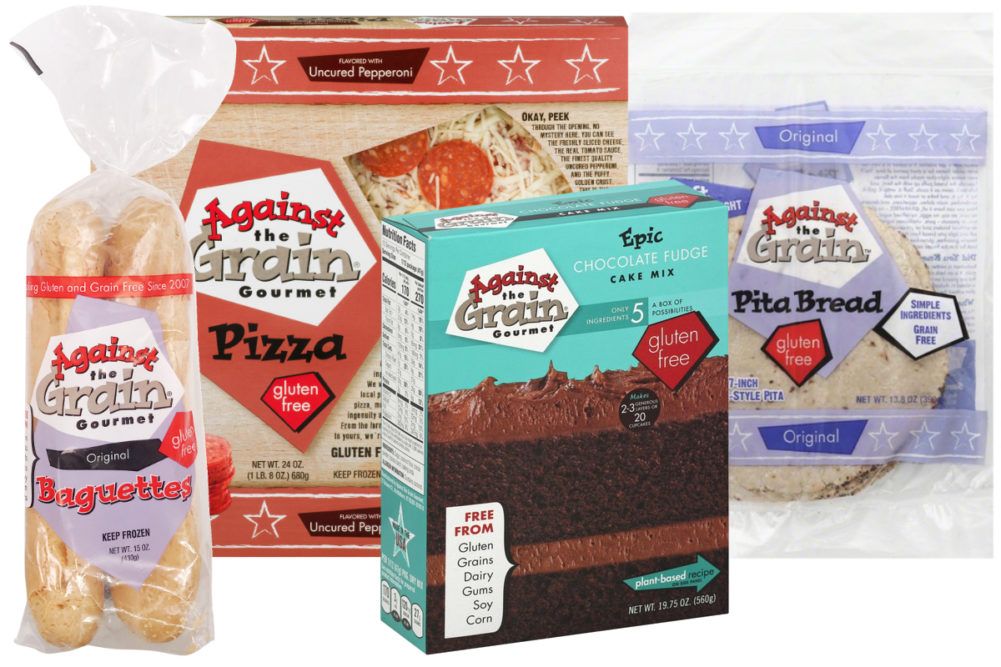BRATTLEBORO, VT. — COVID-19 first appeared on Against the Grain Gourmet founders Nancy and Tom Cain’s radar months ago, when the outbreak began in Asia.
A principal ingredient in the company’s gluten-free frozen pizzas, baking mixes, bread, rolls and bagels is tapioca sourced from Thailand.
“We got it in as quickly as we could,” Ms. Cain said. “We're set for about six months. What happens after that? We don’t know.”
Since then, they have focused on planning ahead before disruptions in the supply chain appear.
“One thing that we’ve had to think about is that we’re a small company competing mostly with the big CPGs, particularly in the pizza market,” Mr. Cain said. “We’re not going to have the same clout in getting what we need, so we have to think ahead.”
The company secured six months’ worth of bacon before its supplier’s facility shut down due to a COVID-19 outbreak.
“We also use a lot of basil, which has to come from California,” Mr. Cain said. “We’ve been having conversations about what happens if they spin out of control in California and there’s problems with our basil supply, or our tomato supply.”
Major interruptions in the supply chain have so far been minimal.
“I don't want to say we got lucky, but we started trying to protect ourselves early on,” Ms. Cain said.
The spread of the outbreak within the United States has led to price increases for some locally sourced ingredients.
“We use over a million fresh shell eggs a year,” Ms. Cain said. “All of the sudden, the price went up 50%, and we get them from a local egg farm here in Vermont. We also use a ton of cheese, and we're having no problems with that. Yet there are farmers dumping milk all over the East. It's very strange time.”
Against the Grain Gourmet has worked with the same local farms for almost 15 years. That strong relationship has helped it keep product moving during the outbreak.
“There is to a certain degree a ‘you watch our backs, we’ll watch yours’ mentality,” Ms. Cain said. “That has served us well.”
The company doesn’t use any copackers, which also has been an advantage.
Some issues have stemmed from the patchwork of state guidelines for determining essential business designations. A month ago, the company that supplies Against the Grain’s bags was deemed nonessential.
“They reached out and asked us to make the case for them,” Ms. Cain said. “I made the extra point that not only can we not fill food if we can’t put it in bags, but the population we serve is one of the most adverse populations with respects to COVID-19.”
Gluten-free products appeal to consumers with celiac disease, Parkinson's disease, Lyme disease and other conditions that may place them at a higher health risk, she said.
As a result, demand for Against the Grain’s frozen pizzas and bread has doubled.
“The process has probably been more intense than it has for regular pizzas,” Mr. Cain said. “You get the sense that people who buy our products are a little more panicked when they can’t get it.”
The company has seen a flood of messages from consumers concerned about stockouts. It also has received reports of entire freezers selling out at record speeds in some stores.
Staff shortages have made meeting demand a challenge. While nobody at the company has been sick, attaining supplies that protect workers’ health has been difficult. The company had problems getting hand sanitizer early on.
“You can't run a food establishment without having sanitizers,” Ms. Cain said. “I had my procurement guy get a bunch of rubbing alcohol, so if it comes down to it, we'll have an alternative.”
Following guidance from the Centers for Disease Control and Prevention that essential workers wear face masks has been a challenge, too.
“We had a lot of people say, ‘Well, we would come to work if we had masks,’” Ms. Cain said. “We went all over the place and finally found a source that would sell us masks. Then FEMA confiscated them when they arrived in the US.”
Despite taking several steps to reduce the risk of an outbreak at its facilities, including increased cleaning and social distancing, some employees are still worried about working during the pandemic. The company is down about 20% of its workforce.
“The irony is that you’ve got massive unemployment while businesses like ours are suffering staffing cuts because of people’s fears,” Mr. Cain said.






